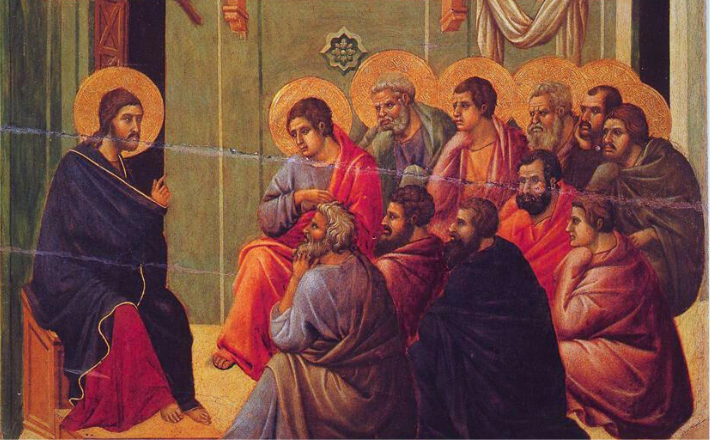Commentary on Psalm 1
Psalm 1 opens the Psalter with words that echo much of the book of Proverbs. Life offers us two paths, and it is up to us to choose which path we will take—the path of the righteous or the path of the wicked, the sinner, and the scoffer (verse 1). On this seventh Sunday of Easter, the psalm is an apt companion reading to the lectionary readings found in Acts 1 and 1 John 5.
The opening word of Psalm 1, ashre’ in Hebrew, is most often translated as either “blessed” (King James Version, New American Standard Bible, New International Version) or “happy” (New Revised Standard Version Updated Edition, Common English Bible). It is the Hebrew word that is paralleled by the Greek makarios, “blessed,” in Jesus’ Sermon on the Mount in Matthew 5.
The Hebrew root word of ashre’ means something like “to walk in a certain way, to follow a certain path.”1 So how do we understand a translation of “blessed” or “happy”? The sense that one is walking in the right direction in life, is doing all the right things, conveys a sense of deep contentment, a great peace of mind. I might not be doing everything perfectly, but I am confident that I am pursuing the direction in life that God wants for me.
How can I be sure of that? How do I know that I am walking in the right direction? Verse 2 answers that question: “But that person’s delight is in the law [the torah] of the LORD, and on the law [the torah] that one meditates day and night.”2 The torah is often understood as the “law” we find in the books of Exodus, Leviticus, Numbers, and Deuteronomy, but the extent of the torah is much larger. It encompasses the stories of creation, of God’s calling of Abram and Sarai, and God’s good provision for our ancestors in the faith—from the stories of Isaac and Rebekah, Jacob and Esau, Leah and Rachel and Bildad and Zilpah, Joseph, Moses, the wilderness wanderings, and the exiled people.
Psalm 1 invites the person who chooses the right path in life to meditate on these wonderful provisions of God. But what does it mean to “meditate”? The Hebrew word is from the root hagah, which means “to muse, to mutter, to recite.” The word conveys the idea of always having the torah at the forefront of one’s thinking, musing over it, reciting its words, and so forth.
Verses 3 and 4 are an extended metaphor. The one who meditates on the torah is likened to a tree planted by streams of water. Trees were a powerful image in the ancient Near East and in the biblical text of strength, wisdom, and longevity. Genesis 2 introduces us to “the tree of life” and “the tree of the knowledge of good and evil” (verse 9). The book of Proverbs extols the “tree of life” as a source of wisdom and right actions (3:18; 11:30; 13:12; 15:4).
In verse 4 of Psalm 1, the wicked, who are likened to chaff that the wind drives away, are contrasted with those who are like trees planted by the waters. The one planted by water is supple and flourishes; it produces fruit and its leaves do not wither. What the tree yields is helpful and nourishing for the next generation, and it keeps on producing. The other is dried up and driven away by the wind, no longer useful for any nourishment or ongoing production.
The closing verses of Psalm 1 summarize and explain the metaphors of verses 3 and 4. The wicked and the sinners, those who do not meditate on the torah but follow their own inclinations, will not “stand in the judgment” or “in the congregation of the righteous,” but the Lord will watch over the way of the righteous (that is, the path, the way that one is walking about).
J. Clinton McCann reminds us that happiness (ashre’) is not found in self-fulfillment but in praising God. He writes, “Prosperity does not involve getting what one wants; rather, it comes from being connected to the source of life—God.”3
Thus the opening words of the book of Psalms invite the reader/hearer to choose to meditate on the torah, on God’s good provisions to God’s people during their history. The Psalter then proceeds, in Psalms 2–150, to rehearse the history of Israel from the time of the reign of David (Books 1 and 2) to the divided kingdom (Book 3), then the exile in Babylon (Book 4), and finally the return from Babylon and the restoration of worship in Jerusalem (Book 5). But none of that history would have been possible without the background provided in the torah, the stories we read in Genesis through Deuteronomy.
As we reflect on the scripture readings for this seventh Sunday of Easter, may we always keep in mind that we are offered two choices, two paths in life: the way of the righteous, with the torah constantly in mind, or the way of the wicked, the sinners, the scoffers, who prefer to follow their own way through life.
Notes
- The word ashre’ occurs 25 times in the Psalter and eight times in Proverbs.
- The author’s own translation. The Hebrew addresses a single person (‘ish), rather than a plurality, as the New Revised Standard Version Updated Edition indicates. The message of the psalm is to each individual person.
- J. Clinton McCann Jr., “The Book of Psalms,” New Interpreter’s Bible, vol. 4, ed. Leander A. Keck (Nashville: Abingdon Press, 1996), 687.


May 12, 2024